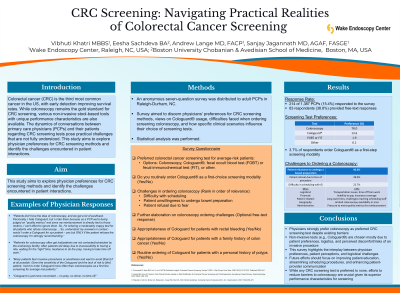Sunday Poster Session
Category: Colorectal Cancer Prevention
P0440 - CRC Screening: Navigating Practical Realities of Colorectal Screening
Sunday, October 27, 2024
3:30 PM - 7:00 PM ET
Location: Exhibit Hall E

Has Audio

Vibhuti Khatri, MBBS
Wake Endoscopy Center
Raleigh, NC
Presenting Author(s)
Vibhuti Khatri, MBBS1, Eesha R. Sachdeva, BA2, Andrew Lange, MD1, Sanjay Jagannath, MD1
1Wake Endoscopy Center, Raleigh, NC; 2Boston University Chobanian & Avedisian School of Medicine, Boston, MA
Introduction:Colorectal cancer (CRC) ranks as the 3rd most common cancer in the US, with early detection improving survival rates. While colonoscopy remains the gold standard for CRC screening, various non-invasive stool-based tools with unique performance characteristics are also available.The dynamics between primary care physicians (PCPs) and their patients regarding CRC screening tests post practical challenges that are not fully understood. This study aims to explore physician preferences for CRC screening methods and identify the challenges encountered in patient interactions.
1Wake Endoscopy Center, Raleigh, NC; 2Boston University Chobanian & Avedisian School of Medicine, Boston, MA
Introduction:
Colorectal cancer (CRC) ranks as the 3rd most common cancer in the US, with early detection improving survival rates. While colonoscopy remains the gold standard for CRC screening, various non-invasive stool-based tools with unique performance characteristics are also available.The dynamics between primary care physicians (PCPs) and their patients regarding CRC screening tests post practical challenges that are not fully understood. This study aims to explore physician preferences for CRC screening methods and identify the challenges encountered in patient interactions.
Methods: An anonymous survey comprising seven questions was distributed to adult PCPs in the Raleigh, NC region. The survey aimed to discern physicians' preferences for CRC screening methods, particularly their views on Cologuard usage, difficulties faced when ordering screening colonoscopy, and how specific clinical scenarios influence their choice of screening tests.
Results: Of 1387 PCPs contacted, 214 responded to the survey. A majority (78%) indicated colonoscopy as their preferred screening CRC test. 13.6% favored Cologuard as the initial screening method while a smaller percentage opted for FOBT or FIT test. Only 3.7% of providers reported automatically ordering Cologuard without offering colonoscopy as an option. Challenges in ordering colonoscopies were patient reluctance to do a bowel prep (46.6%), fear of the procedure (28.6%), and difficulty in scheduling a procedure with GI (22.7%). Other patient concerns included the invasive nature of colonoscopy, and logistical hurdles (transportation, insurance coverage, time from work).
Discussion: The survey findings underscore a strong physician preference for colonoscopy in CRC screening, however, barriers exist that lead physicians to opt for non-invasive tests, notably Cologuard, due to patient preferences driven by logistical ease and perceived discomfort from an invasive procedure. This study highlights the interplay between physician preferences, patient perceptions, and logistical challenges in CRC screening. Future efforts should focus on improving patient education, streamlining scheduling procedures, and enhancing patient-provider communication. While any CRC screening test is beneficial compared to no screening, efforts to reduce barriers to colonoscopy are crucial, given its superior diagnostic capability.
Disclosures:
Vibhuti Khatri indicated no relevant financial relationships. Eesha Sachdeva indicated no relevant financial relationships. Andrew Lange: REgeneron – Speakers Bureau.Sanjay Jagannath indicated no relevant financial relationships.
Vibhuti Khatri, MBBS1, Eesha R. Sachdeva, BA2, Andrew Lange, MD1, Sanjay Jagannath, MD1. P0440 - CRC Screening: Navigating Practical Realities of Colorectal Screening, ACG 2024 Annual Scientific Meeting Abstracts. Philadelphia, PA: American College of Gastroenterology.
Results:
